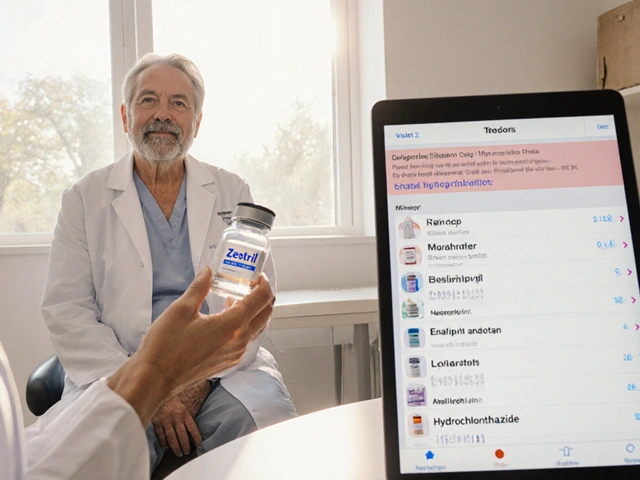Understanding Ovarian Cancer and Its Current Treatments
As a blogger and health advocate, I can't stress enough the importance of understanding our bodies. Among the many health challenges that affect women, ovarian cancer is one of the most serious. It begins in the ovaries and can spread to other parts of the body if not detected and treated early. Current treatments for ovarian cancer include surgery, radiation therapy, and chemotherapy. While these treatments can be effective, they often come with side effects and can greatly impact the quality of life. This is where the potential of clinical trials comes into play.
Introduction to Clinical Trials: What They Are and How They Work
Before we delve into the specifics of ovarian cancer clinical trials, it's crucial to understand what clinical trials are in general. Clinical trials are scientific studies conducted to find better ways to prevent, screen for, diagnose, or treat diseases. They can also show researchers what does and doesn’t work in humans that cannot be learned in the lab or in animals. In a clinical trial, volunteers receive specific interventions according to a research plan or protocol created by investigators. These interventions may be medical products, such as drugs or devices, or procedures. Each trial contributes to medical knowledge and patient care.
The Potential of Ovarian Cancer Clinical Trials
Ovarian cancer clinical trials aim to explore and develop new and more effective treatments for this disease. They offer hope for many patients who have not had success with standard treatments or who are looking for options with less severe side effects. The trials can explore a wide range of treatments, including new drugs, new approaches to surgery or radiation therapy, and new methods of treatment delivery. Each trial has the potential to change the future of ovarian cancer treatment.
Participation in Ovarian Cancer Clinical Trials: What to Expect
If you're considering participating in an ovarian cancer clinical trial, it's important to know what to expect. Typically, you'll start with a screening process to determine if you're eligible. If you are, you'll receive detailed information about the trial and its potential risks and benefits. Your participation is completely voluntary, and you can withdraw at any time. During the trial, you'll receive the experimental treatment and regular monitoring to track your progress and any side effects. You'll also have a team of healthcare professionals supporting you throughout the process.
Benefits and Risks of Participating in Ovarian Cancer Clinical Trials
Participating in a clinical trial can offer several benefits. You'll have access to new treatments that are not yet available to the public. You'll also be contributing to research that could help future patients. However, there are also risks. The experimental treatments may not be better than the standard treatment, or they may have side effects that doctors don't fully understand yet. It's crucial to weigh these benefits and risks carefully and discuss them with your healthcare team before deciding to participate.
Finding Ovarian Cancer Clinical Trials: Resources and Support
Finally, if you're interested in finding ovarian cancer clinical trials, there are several resources available. Many major hospitals and cancer centers have information on current clinical trials. There are also online resources, such as ClinicalTrials.gov, a database of privately and publicly funded clinical studies conducted around the world. Always remember, your healthcare team can provide guidance and support as you navigate your options and decide what's best for you.
I hope this article has shed some light on the potential of ovarian cancer clinical trials and the role they can play in exploring new treatment options. Remember, knowledge is power when it comes to our health. Stay informed and empowered.








July 7, 2023 AT 08:45
Megan Raines
So let me get this straight - we’re putting people in trials because chemo makes you feel like a zombie, but the new stuff might make you feel like a zombie with better Wi-Fi? 🤔
Still, if it means not losing my hair before my 30th birthday, I’m in. Just don’t make me sign a waiver that says I agree to become a lab rat in exchange for a free tote bag.
July 8, 2023 AT 22:00
Mamadou Seck
Clinical trials man they got me thinking like maybe the real cure is just not getting cancer in the first place like why are we always chasing ghosts when we could just tell people to stop eating processed crap and go outside
also i think the word ovarian is just too long and people forget what it means so the whole thing falls apart
July 10, 2023 AT 08:31
Anthony Griek
I’ve seen a cousin go through this. Not the trial part - the chemo part. She said the worst part wasn’t the nausea, it was the silence. Like everyone around her stopped talking like she was already gone.
Trials don’t fix that. But if they give someone a chance to laugh again - even for a minute - that’s worth something. Not everything has to be a breakthrough to matter.
July 10, 2023 AT 08:42
Norman Rexford
Look i dont mean to be rude but america is the only country that thinks you need a 12 step approval process just to try a new pill
in russia they just give you the drug and say good luck
and honestly i think the real problem is women arent eating enough meat and doing enough deadlifts
also why is everyone so scared of science when we put men on the moon
July 10, 2023 AT 17:03
Wayne Keller
I appreciate you breaking this down clearly. A lot of people feel lost when they hear 'clinical trial' - like it’s some sci-fi experiment. But it’s really just science trying to do better.
One thing I’d add - if you’re considering joining, ask about the control group. Not everyone gets the new treatment. Some get the current standard. That’s not a bad thing - it’s how we know if the new thing actually works.
And if you’re nervous? Bring someone with you to the info session. Even if it’s just to hold your hand. You don’t have to do this alone.